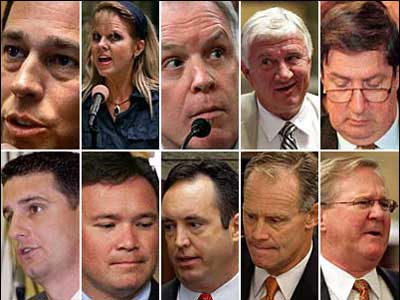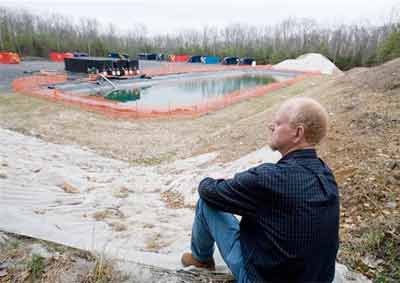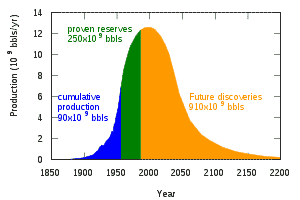Biblio

The West Virginia Highlands Conservancy, Friends of Blackwater, and former West Virginia State Park Chief Cordie Hudkins have taken the fight over the proposed drilling for natural gas in Chief Logan State Park to the West Virginia Supreme Court of Appeals. There they have been joined by the West Virginia chapter of the Sierra Club as well as the West Virginia Division of Natural Resources and the West Virginia Department of Energy who also oppose the drilling.
The controversy is over a proposal by Cabot Oil and Gas to drill several gas wells inside Chief Logan State Park. The Department of Environmental Protection had originally denied the permit to drill based upon a statute which it believed prohibited drilling for gas in a state park. Cabot Oil and Gas (the driller) appealed to the Circuit Court of Logan County which reversed the Department of Environmental Protection and ordered that the permit be issued.
The case also has the potential to interfere with an important source of funding for West Virginia’s parks and recreation. West Virginia receives extensive funding for its parks from the federal Land and Water Conservation Fund. A condition of that funding is that the land dedicated for park use remain so and not be converted for non-recreational use. If West Virginia allows part of Chief Logan to be converted from recreational use to minerals extraction, this would interfere with funding under this program.
Sourcewatch page provides overview including links to directors, funders, and board members.
See FAS page on Earth Systems:
"Over the next century the earth’s resilience and adaptive capabilities will be stressed by the demands of global climate change, environmental degradation, a population increase of two billion people, and the accompanying increased resource and energy demand.
These stresses will place an additional burden upon the earth’s natural systems and the processes and resources that drive these systems. Future system scarcities and imbalances represent a security concern with the potential to destabilize and weaken existing political, social, and economic structures. And as these natural systems are inherently highly interdependent, it is necessary for them to be analyzed and considered systemically.
The Earth Systems Program seeks to address these issues by developing and promoting sustainable, scientifically sound, and inclusive solutions, policies, and technological developments."
"The Federation of American Scientists (FAS) was founded in 1945 by scientists who had worked on the Manhattan Project to develop the first atomic bombs. These scientists recognized that science had become central to many key public policy questions. They believed that scientists had a unique responsibility to both warn the public and policy leaders of potential dangers from scientific and technical advances and to show how good policy could increase the benefits of new scientific knowledge."
FAS works to challenge excessive government secrecy and promote public oversight with their FAS Project on Government Secrecy. Part of the project includes the distribution of the free electronic newsletter Secrecy News, which provides informal coverage of new developments in secrecy, security and intelligence policies.
Includes video interview with Hans Bethe on Atomic weapons.
Please note that information taken from Wikis should be verified using other, more reliable sources. It is a good place to start research, but because anyone can edit a Wiki, we do not recommend using it in research papers or to obtain highly reliable information.
--Editors: Flynn McRoberts, Susan Warren
This article examines the lawsuit against Exxon filed by Texas rancher Elizabeth Burns.
See: Rancho Los Malulos | A satirical view from the McGill Brothers Lease
Oil’s ‘Ugly Side’
“This isn’t something the states are proud to advertise,” said Philip Dellinger, chief of the groundwater section in the Austin, Texas, office of the Environmental Protection Agency. “It’s the ugly side of the oil and gas business.”
The EPA says it has no authority to force companies to address contamination on active fields and must defer to Texas regulators, who let oil companies determine if sites need cleanup.
...Pollution from decades-old wells and waste pits isn’t isolated to their ranch or Exxon. There are more than 100,000 old wells in Texas that haven’t been capped and thousands of defunct gas-processing plants, compressor stations and related equipment that have never been dismantled, according to the Texas Land and Minerals Owners Association, which represents 1,200 ranchers, farmers and individuals who own stakes in oil and gas fields.
Contamination Migrates
The contamination may have migrated from a defunct oilfield on the north end of town, where sludge and other waste from wells was dumped in open dirt pits for decades, said J.T. Garcia, president of the Duval County Conservation and Reclamation District. He doesn’t know who operated the field, which stopped pumping crude in the 1970s.
The Burns’s ranch, which covers an area equal to the size of Brooklyn, is just one example of the lingering environmental damage across swaths of south, west and east Texas from what were once regarded as acceptable oilfield practices, said Patterson, the commissioner with the Texas General Land Office, which oversees oil leases that help fund the state’s schools and universities.

Mrs. Burns | Photo by Sharon Wilson
“They’d just dig a pit and put the oil in it and then they’d haul it off later, or maybe they wouldn’t haul it off later, depending on the price of oil at the time,” said Patterson. “That was the norm, and nobody said anything about it.”
...Although lighter-weight hydrocarbons can degrade naturally in 40 or 50 years, the heavier molecules “are more persistent and pretty toxic,” said Gregory Miller, project manager at Icon Environmental Services Inc., a Port Allen, Louisiana-based company that cleans up old oilfields. “You have no idea how bad some of these sites are.”
Daunting Task
Patterson said cleaning up a tract as large as the Encinitos Ranch is impossible. Instead, the best solution may be to fence it off and monitor the pollution to ensure it doesn’t migrate underground to other ranches...
...“Exxon’s walked away from a lot of this stuff they built here, but the evil lurks,” said Burns, who had planned to raise organic vegetables when she and her husband moved to the ranch with their sons five years ago. “You’d hope your kids can do something with this land, but now it’s worthless.”
By Joel Kirkland of ClimateWire, New York Times.
The $31 billion Exxon-XTO all-stock deal still has to jump some regulatory hurdles. If the merger becomes real, Exxon will be the largest natural gas producer in the country, controlling large chunks of acreage in the most promising onshore gas fields in the United States.
Texas, Louisiana, Oklahoma, Arkansas and the Appalachian regions of Pennsylvania and New York are the epicenter of shale gas, coalbed methane and tight-sand gas formations.
See: Marching Band, Quail Hunt Helped Exxon’s Tillerson to XTO Deal - Bloomberg.com
By Jim Polson. Bloomberg Business Week. January 21, 2010.
Exxon Mobil Corp., XTO Energy Inc. and other shale-gas producers probably won’t face U.S. rules that would add costs of $100,000 a well, given comments at a Congressional hearing yesterday and the loss of a Senate seat by majority Democrats, FBR Capital Markets Corp. analysts said.
Irving, Texas-based Exxon’s $30 billion acquisition of XTO isn’t in jeopardy, Benjamin Salisbury and other FBR analysts wrote in a report to clients today. U.S. laws making shale development “illegal or commercially impracticable” would let Exxon terminate the deal without penalty, under the buyout agreement.
Democrats at the hearing praised the economic and environmental benefits of replacing fuels such as coal with cleaner-burning natural gas, indicating the party will emphasize jobs and the economy rather than restrictions on fracturing petroleum-bearing rock that might curb drilling by as much as 20 percent, the analysts wrote. Environmentalists said chemicals in fracturing fluid contaminate drinking water.
ExxonMobil. The Lamp. No. 4, 2009. p. 7-8.
Andrew Swiger, Exxon Senior V.P. has said,
"A key question about shale and other unconventional plays will be whether a company has the technology to turn them into profitable opportunities.
Swiger notes that technology advances ExxonMobil has perfected in producing unconventional natural gas from tight-sands formations in Colorado’s Piceance Basin should prove advantageous.
ExxonMobil‐XTO Merger:
Read preliminary transcripts of Rex Tillerson, CEO, giving testimony to the House Energy Committee.
ExxonMobil‐XTO Merger: Impact on U.S. Energy Markets Preliminary Transcript of Testimony, House of Representatives, Subcommittee on Energy and Environment, Committee on Energy and Commerce. Wednesday, January 20, 2010. 122 pages.
This merger heralds a fundamental long‐term shift in U.S. energy markets and one that deserves our close attention. Over the last decade, a small group of companies that most Americans have never heard of has been developing huge deposits of natural gas in deep shale formations across America."
-Edward J. Markey (D-MA), Chair of Subcommittee on Energy and the Environment.Tillerson testimony on p. 52.
Between now and October 1st, the state legislature will debate a new tax on natural gas extraction. But because of a loophole in the state's campaign finance laws, legislators will likely cast their votes before disclosing recent donations. That means the gas industry and environmental groups can flood Harrisburg with contributions without anyone knowing where the money is going.
That's why "It's Our Money” and Common Cause have teamed up to create a place where lawmakers can report contributions in real time: Marcellus Shale Money Watch.
Pennsylvania's environmental destruction is not limited to gas drilling. See: Coalfield Justice Blog, "What Could Be Worse?
Here is what could be worse: all the concern about shale gas has made the public unaware of other continuing problems. Big coal continues to destroy houses and streams. No one is demanding that the long overdue Act 54-required study of longwall mining be released. Big coal is continuing to do as it will with coal ash. With budget cuts in DEP, longwall enforcement, which has never been adequate, will be even worse.
From EOG website: EOG Resources, Inc. is one of the largest independent (non-integrated) oil and natural gas companies in the United States with proved reserves in the United States, Canada, Trinidad, the United Kingdom and China. EOG Resources, Inc. is listed on the New York Stock Exchange and is traded under the ticker symbol “EOG."
An EOG blew out in Clearville PA. on June 4, 2010.
From Sourcewatch: On June 4, 2010, a western Pennsylvania natural-gas well owned by EOG Resources Inc. blew out, releasing an undisclosed amount of gas and drilling fluids before being contained about 16 hours later, as reported by the Wall Street Journal and The Boston Globe.
Operators at this site were preparing to extract gas after through [hydrofracking]]. In a press release, the Pennsylvania Department of Environmental Protection stated that it would "aggressively investigate" the Marcellus Shale well blowout and that it would take the "appropriate enforcement action."
"As a result, the well released natural gas and flowback (fracturing) fluid onto the ground and 75 feet into the air," the Pennsylvania Department of Environmental Protection said in the press release. It should be noted that EOG Resources is the new namesake for the company formerly known as Enron.
NEW ORLEANS, Louisiana, August 30, 2010 (ENS) - Two environmental groups Friday filed a motion to intervene in the lawsuit brought by Texas Attorney General Greg Abbott and the State of Texas against the U.S. Environmental Protection Agency regarding the EPA's June 2010 disapproval of part of Texas' air permitting program.
Environmental Defense Fund and Environmental Integrity Project filed the motion in the U.S. Court of Appeals for the 5th Circuit in New Orleans.
The environmental groups are seeking to intervene on the side of the EPA. If they are allowed to intervene, they will argue that the agency properly disapproved the Texas Flexible Air Permitting program.
"Governor [Rick] Perry wants people to think that Washington is picking on him," said EDF energy program director Jim Marston. "The truth is he wants Texas to get a special pollution pass that no other state gets."
"All other 49 states follow the Clean Air Act, and it's time that politicians and polluters in Texas follow it, too," Marston said. "Our intent is to make sure this lawsuit considers the facts and science surrounding this issue and that re-election campaigns aren't waged in the courtroom."
See Molly Ivins. Bushwhacked: Life in George W. Bush's America
See: Ramon Alvarez. April 16, 2010. "Barnett Shale gas producers caught with their hands in the cookie jar".
"Natural gas producers should not impede the city’s efforts to better characterize their industry's air pollution. After all, if industry’s claims are true that the natural gas production in Fort Worth does not produce harmful emissions, then they should have nothing to fear from a thorough and independent city-sponsored study."
An Uncommon Approach: Four Core Strategies
Founded in 1967 as the Environmental Defense Fund, we tackle the most serious environmental problems with:
See our history of results.
Photo By Kalim A. Bhatti, for USA Today. 4/28/2010.
Bob Myers, an avid hiker, in Lock Haven, Pa., has become concerned that state forests are being freely leased to drilling firms, leading to clear-cutting of forests, sludge pits and risks of accidents.There have been many incidents of water contamination and even buildings exploding because of natural gas hydro-fracturing operations. The most common problem is methane migration due to defective casing.
According to the Pittsburgh Geological Society's article "Natural Gas Migration Problems in Western Pennsylvania" methane migration occurs when natural gas escapes "from the reservoir rock, coal seam, pipeline, gas well, or landfill. If the gas migrates through the bedrock and soil, it can result in an explosion capable of damaging property and causing loss of life."
Bob Myers has written an informed overview on the impact and consequences of hydraulic fracturing in Pennsylvania. In the section titled, "The Pennsylvania Natural Gas Industry Wall of Shame", he lists violations and pollution from 2009-2010.
Supporters of the gas industry often claim that we have nothing to fear from the big, reputable companies. But, the incidents listed above were caused by Cabot, Range Resources, Anadarko, Chesapeake, East Resources, Talisman, Fortuna. Who's left?"
Professor Myers received his Ph.D. from Penn State in 1991. He teaches American Literature, and has published a biography of the author Harold Frederic, as well as several articles on late-19th-century literature.
ALBANY, NY (05/04/2011)—The New York Water Rangers, individuals working to protect state waters from dirty gas drilling and hydraulic fracturing, or “fracking,” today thanked the State Assembly’s Environmental Conservation Committee for passing legislation that would close a loophole in state law allowing the gas industry to circumvent requirements for the management and disposal of hazardous waste (A.7013 / S.4616).
The Defining Hazardous Fracking Waste bill would update state law so that any drilling waste that meets the characteristics of hazardous waste is subject to all state regulations related to its generation, transportation, treatment, storage, and disposal.
“Why should the gas industry get a free pass on hazardous fracking waste? If wastewater generated by dirty gas drilling and fracking is hazardous, it must be treated as such in order to protect the health and safety of our communities and our waters.”
The New York Water Rangers are now calling on members of the Assembly Codes Committee to pass the bill without haste and keep it on track.
A new Marist College poll revealed that 41 percent of New Yorkers oppose fracking, and 21 percent aren’t sure where they stand on the issue. We’re committed to educating these undecided New Yorkers, especially the state lawmakers among them.
------------------------------------------------
Environmental Advocates of New York's mission is to protect our air, land, water and wildlife and the health of all New Yorkers. Based in Albany, we monitor state government, evaluate proposed laws, and champion policies and practices that will ensure the responsible stewardship of our shared environment.
We work to support and strengthen the efforts of New York's environmental community and to make our state a national leader.
A logistic distribution shaped production curve, as originally suggested by M. King Hubbert in 1956.
See the U.S. Department of Energy (DOE), International Energy Outlook, for information on energy trends.
The Energy Policy Act of 2005 (Pub.L. 109-58) is a bill passed by the United States Congress on July 29, 2005, and signed into law by President George W. Bush on August 8, 2005, at Sandia National Laboratories in Albuquerque, New Mexico. The act, described by proponents as an attempt to combat growing energy problems, changed US energy policy by providing tax incentives and loan guarantees for energy production of various types.
Criticisms
The Washington Post contended that the spending bill is a broad collection of subsidies for United States energy companies; in particular, the nuclear and oil industries.
..."House Majority Leader Tom DeLay (R-Tex.) also managed to insert at least $500 million in subsidies over a 10-year period -- with the option to double the amount -- for research into deep-water oil and gas drilling, a grant that many lawmakers expect to go to the Texas Energy Center in DeLay's home town of Sugar Land. The bill also includes royalty relief for deep-water drilling projects, a strategy that helped jump-start production in the Gulf during the 1990s..."
Senator Hillary Rodham Clinton made the bill an issue in the 2008 Democratic Primary by criticizing Senator Barack Obama’s two votes supporting the bill, calling it the "Dick Cheney lobbyist energy bill."
This bill exempted fluids used in the natural gas extraction process of Hydraulic fracturing from protections under the Clean Air Act, Safe Drinking Water Act, and CERCLA. The proposed Fracturing Responsibility and Awareness of Chemicals Act would repeal these exemptions.
Please note that information taken from Wikipedia should be verified using other, more reliable sources. It is a good place to start research, but because anyone can edit Wikipedia, we do not recommend using it in research papers or to obtain highly reliable information.
 "Energy in Depth (EID) is a pro-oil-and-gas drilling industry front group formed by the American Petroleum Institute, the Petroleum Association of America and dozens of additional industry organizations for the purpose of denouncing legislation proposed by Colorado U.S. Rep. Diana DeGette to regulate underground hydraulic fracturing fluids."
"Energy in Depth (EID) is a pro-oil-and-gas drilling industry front group formed by the American Petroleum Institute, the Petroleum Association of America and dozens of additional industry organizations for the purpose of denouncing legislation proposed by Colorado U.S. Rep. Diana DeGette to regulate underground hydraulic fracturing fluids."
"The Center for Media and Democracy (CMD) publishes SourceWatch, this collaborative, specialized encyclopedia of the people, organizations, and issues shaping the public agenda. SourceWatch profiles the activities of front groups, PR spinners, industry-friendly experts, industry-funded organizations, and think tanks trying to manipulate public opinion on behalf of corporations or government. We also highlight key public policies they are trying to affect and provide ways to get involved."























